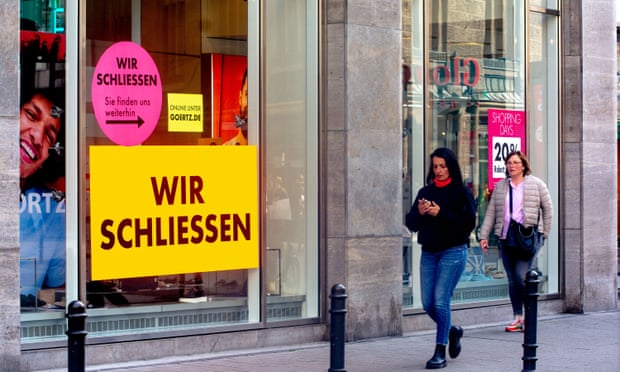German economy in recession after high prices take toll, revised figures reveal
Germany has fallen into recession, fresh figures have revealed, after high prices took a bigger toll on the country’s economy than originally estimated.
Updated data released by German’s federal statistical office on Thursday showed gross domestic product (GDP) fell by 0.3% in the first quarter compared with the previous three months, which also recorded a contraction.
The revised numbers confirm that the German economy shrank for two straight quarters – the technical definition of a recession – after a 0.5% drop in the three months to December. Initial estimates released in April had suggested that Germany had narrowly avoided a recession, merely stagnating with 0% growth.
“It took a couple of statistical revisions, but at the end of the day, the German economy actually did this winter what we had feared already since last summer: it fell into a technical recession,” said Carsten Brzeski, global head of macro at the Dutch bank ING.
The statistics office said that while private sector investment and construction grew at the start of the year, this was offset in part by a drop-off in consumer spending as higher prices forced households to pinch their pennies.
“The persistence of high price increases continued to be a burden on the German economy at the start of the year,” the statistics office said.
Overall, household spending dropped 1.2% in the first quarter, with shoppers less willing to splash out on food, clothes, and furniture. Government spending also dipped by 4.9% compared with the previous quarter.
Overall, Brzeski said the overall drop in GDP was “not the worst-case scenario of a severe recession but a drop of almost 1% from last summer. The warm winter weather, a rebound in industrial activity, helped by the Chinese reopening and an easing of supply chain frictions, were not enough to get the economy out of the recessionary danger zone,” he added.
The economist warned that the drop in purchasing power, weaker industrial sector orders, rising interest rates, as well as a slowdown in foreign economic growth in countries including the US would all likely lead to weaker economic activity for Germany in the months ahead.
“On top of these cyclical factors, the ongoing war in Ukraine, demographic change and the current energy transition will structurally weigh on the German economy in the coming years,” Brzeski added.





Post a Comment